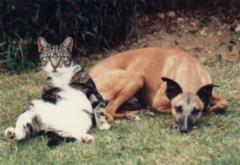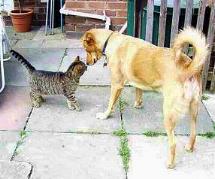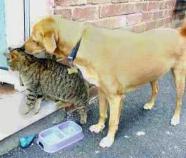|
Badger (moggy cat) & Boy (whippet dog), Chelmsford, England courtesy of Avril Hodgkins. Retreiver & tabby photos courtesy of Ian Calderbank. |
|
ARE DOGS ARE MORE FAITHFUL THAN CATS?
Dogs and cats behave differently towards humans because they evolved in the wild to have different social structures and different hunting strategies. Dogs live and hunt communally and their survival strategy is a tight-knit pack with a hierarchy where every individual knows who is boss to it and who it can boss around; they catch prey larger than themselves and the catch is shared with others. Dogs need to know their ranking in a pack for the pack to work together efficiently. Cats form loose colonies based on the availability of food in their area, but they usually hunt alone; they hunt prey smaller than themselves and do not share their food with other adult cats. Both species will scavenge; dogs will normally only allow other pack members to scavenge the same place, cats may tolerate other cats being present if there is enough food present.

Dogs are pack animals and are subservient to a pack leader; in the domestic environment, you are the pack leader and your dog does what it is told. What appears to be faithfulness is often the submissive behaviour of an animal evolved to be social. Cats do not form hierarchical packs, but they do form colonies based around related cats. The females form the a loose hierarchy while the males are more solitary and often itinerant, visiting different females in different parts of their territory. Cats initially view you as individuals sharing the same space and their attachment to you depends on your behaviour towards them - a bullied cat leaves or retaliates, a bullied dog all too often comes back for more. Feline aloofness is the indifferent behaviour of an animal which does not live in strictly hierarchical communities and has not needed to develop canine-style social behaviour. For a detailed look at feline social structures see The Unsociable Cat.
SUBMISSIVE LOVE
In cruel experiments, fully conscious dogs have been vivisected by their scientist owners to see how "faithful" they remain. Despite the most appalling things being done to them, the dogs licked their owner's hand during the experiments. The most famous experiment was around a century ago and was designed to test a Spaniel's loyalty to its master. Despite the things done to it (including removing its eyes without anaesthetic), the dog continue to trust its master and to lick the hand that was torturing it. Because the owner is considered the pack leader, the dogs remained obedient and submissive in spite of the most appalling mistreatment. In fact the dogs remained "faithful" until they had effectively been tortured to death. Thankfully these experiments are no longer performed, but this side of a dog's character can be seen in the classical image of the mistreated pet dog who remains faithful to its abusive owner. Basically it doesn't know what else to do.

In wolf packs, there is often a pariah (outcast) who is bullied and tormented by more dominant animals. In spite of this, the pariah stays with the pack as it has a better chance of survival this way. When approaching more dominant dogs, the pariah grovels to show that it knows its place. It also accepts being bullied because it has less chance of surviving alone. Many dogs are undoubtedly attached to their owners, but their innate social behaviour, in particular their submissiveness to a pack leader (the owner) can often be mistaken for faithfulness.
Dogs have been kept as companions or utility animals for centuries. Modern pet dogs have been bred to retain puppy-like looks and behaviour (some guarding and fighting breeds have had aggressiveness deliberately bred into them). For example, barking is a puppy trait. Though nurtured, indulged and played with by the adults, puppies are low down in the pack ranking. The adults in the pack protect the puppies so your dog often sees itself as the puppy with you as a protector. However, adults will also discipline the puppies if they misbehave too much - hence a pet dog can be disciplined to modify its behaviour.
Animal trainers know that dogs react well to a reward system, being praised when they do the right thing. In the dog's eyes, this is acceptance and approval from other members of its pack; the alternative is pariahship.
Though dogs very obviously display affection, joy and altruistic behaviour towards their owners, when you talk about your dog being faithful to you, you must also consider "is it individual affection or is it canine submissiveness?" Much of what we consider to be faithfulness are behavioural traits arising from the dogs wild instincts.
CUPBOARD LOVE
Cats form attachments to humans but are not submissive and will not tolerate the same amount of abuse that a dog will. Cats do not have a sense of their rank in a pack and do not consider that it is your birthright to bully them into faithfulness. A mistreated cat will leave if it can. A mistreated dog will often come back for more because it learns that its place in the human pack is the pariah position.
Where several cats live in a confined or isolated colony, there may be a pariah cat. Unlike a pariah dog it will not show appeasement behaviour (begging or grovelling) but will normally isolate itself to avoid being bullied. If possible it will leave the area. If not possible it will avoid its tormentors. Unlike dogs, cats have no vested interest in staying in a pack. If they can't leave the area e.g. they are confined or it is the only available food, they will eat, urinate or defecate when the other cats aren't around.
Cats have not been selectively bred for as long as dogs, so they retain far less infantile (kittenish) behaviour. Traditionally cats were kept to control vermin. This did not require them to be especially faithful to individual humans. Only in the last few decades have cats been bred for appearance or for temperament (some breed standards contain clauses relating to temperament).

Cats which are brought up in a loving household are often faithful to their household or to particular individuals. Because this has to be earned by the owner, it is a far more precious thing than a dog's submissiveness. Cats also look after themselves and will visit neighbours to take advantage of company, food, warmth etc, but most will return to their own household if you are providing a comparable level of care. This is because a cat is a solitary hunter and has evolved to take advantage of a food supply it can exploit alone. Dogs hunt as packs and the pet dog sees you as a companion hunter - its survival prospects are best served by staying with you, however you treat it.
Cats often bring home their hunting trophies as a sign of appreciation. It is their contribution to a food supply - just as they would provide food for their kittens or for communally reared kittens. They also consider your home to be a safe den where food can be eaten without the threat of being stolen. The fact that you do not appreciate the gift, or you release it is possibly viewed as you being a rather wayward and inept kitten though many owners give their cat some cat food to compensate for the lost prey item.
Cats can be trained, but unlike dogs they demand tangible rewards such as food, not just lavish praise. A cat's behaviour is not set up so that praise alone is a sufficient reward. To a cat, getting a food treat after performing a trick is just like having a success hunting and getting some prey at the end of it.
Cats are often faithful to places rather than people, because their survival depends on establishing a territory, not on following a migrating herd of deer.
CATS ARE OFTEN AS FAITHFUL AS DOGS
Cats are often as faithful to their owners as are dogs, but they display this is different ways because of their different predatory style and different social habits. Their social habits are discussed in depth in The Unsociable Cat. Cats will greet you with a tail quiver, but dogs may fawn, lick and beg as though they are puppies begging an adult to regurgitate food after a hunting trip. Cats greet you as an equal though a really affectionate cat may roll over and present its belly for grooming as though it is a kitten greeting its mother.
The biggest difference is that dogs are obedient (faithful) to their pack-leader by nature, but a cat's faithfulness must be earned and can't be bullied into it. Once you have taken time to earn your cat's affection and devotion, you will find it just as faithful, or more so, than a dog.
|
Badger (moggy cat) & Boy (whippet dog), Chelmsford, England courtesy of Avril Hodgkins. Retreiver & tabby photos courtesy of Ian Calderbank. |
|
|
"Do You Copy?" (Copyright Libby Cook-Toppan) |
For a tale of cats and dogs living together, see
Reigning Cats and DogsFURTHER READING